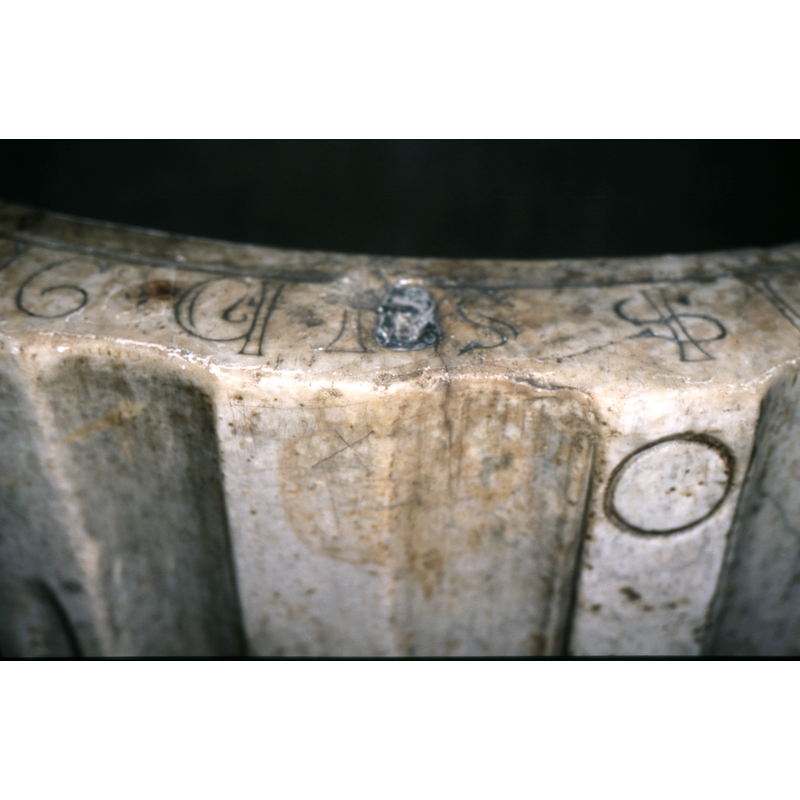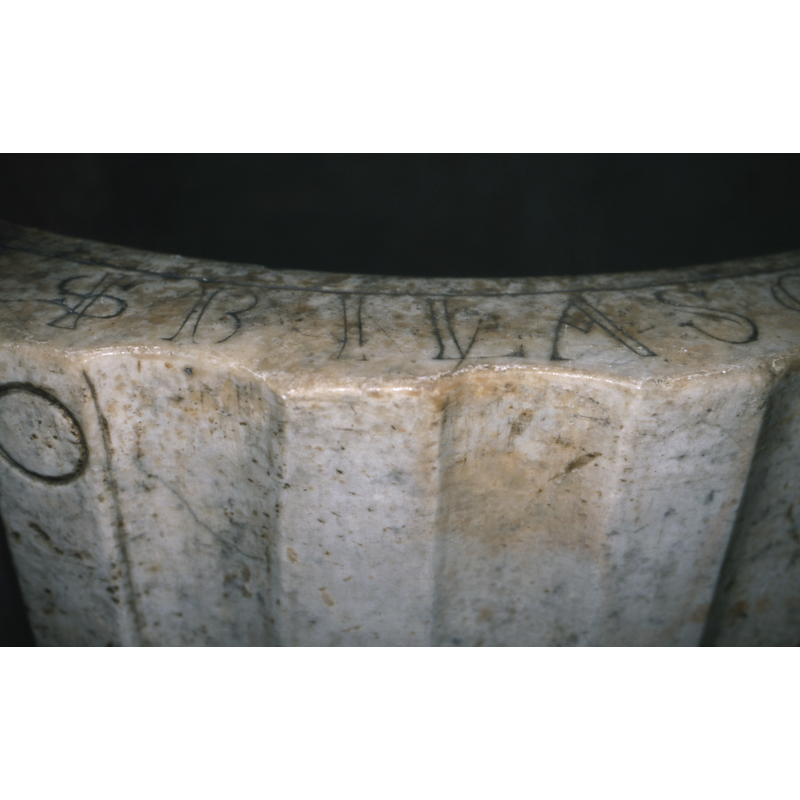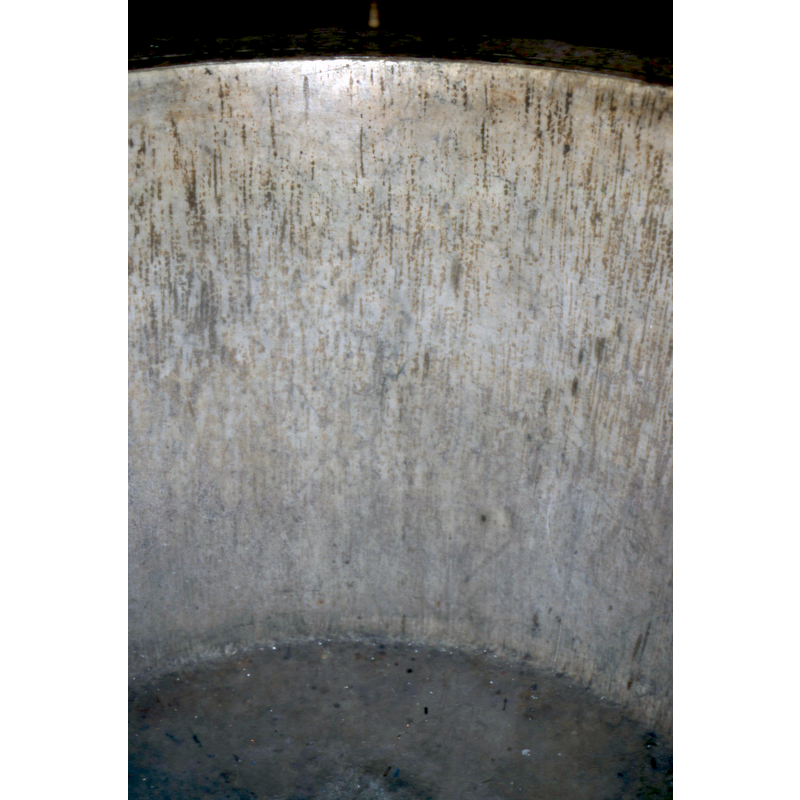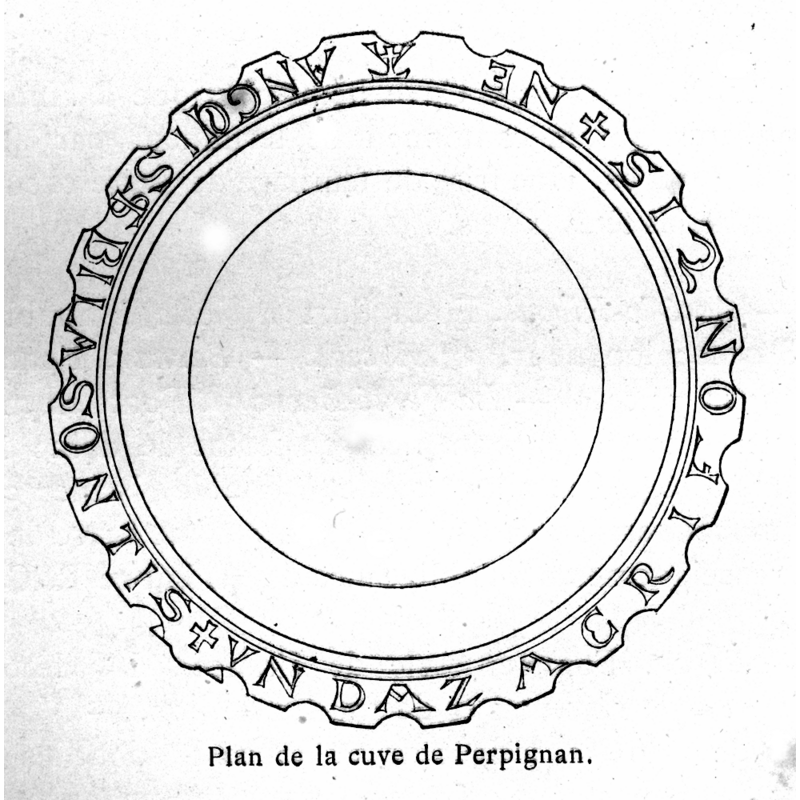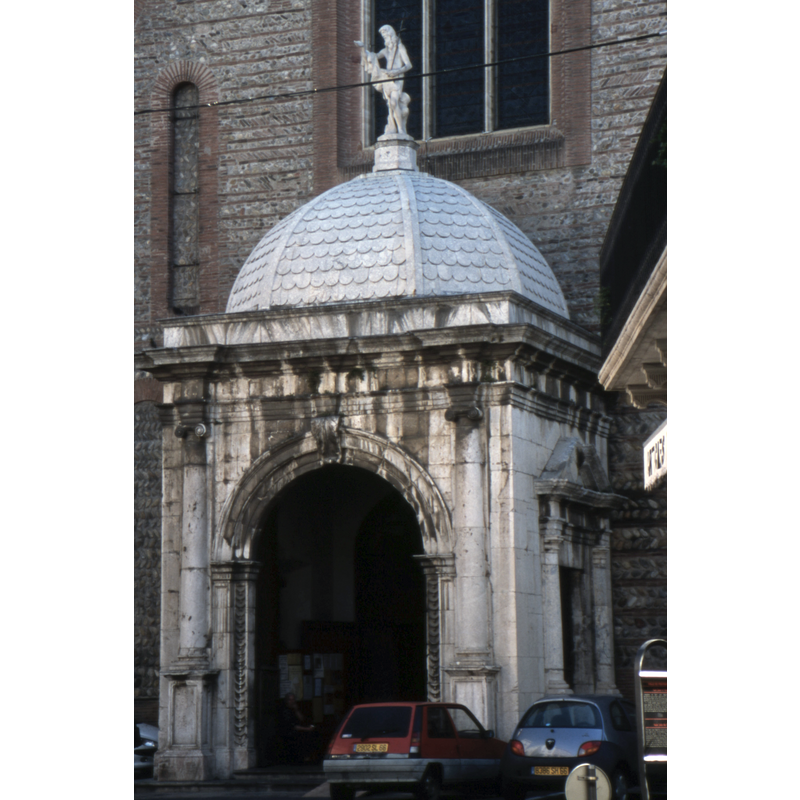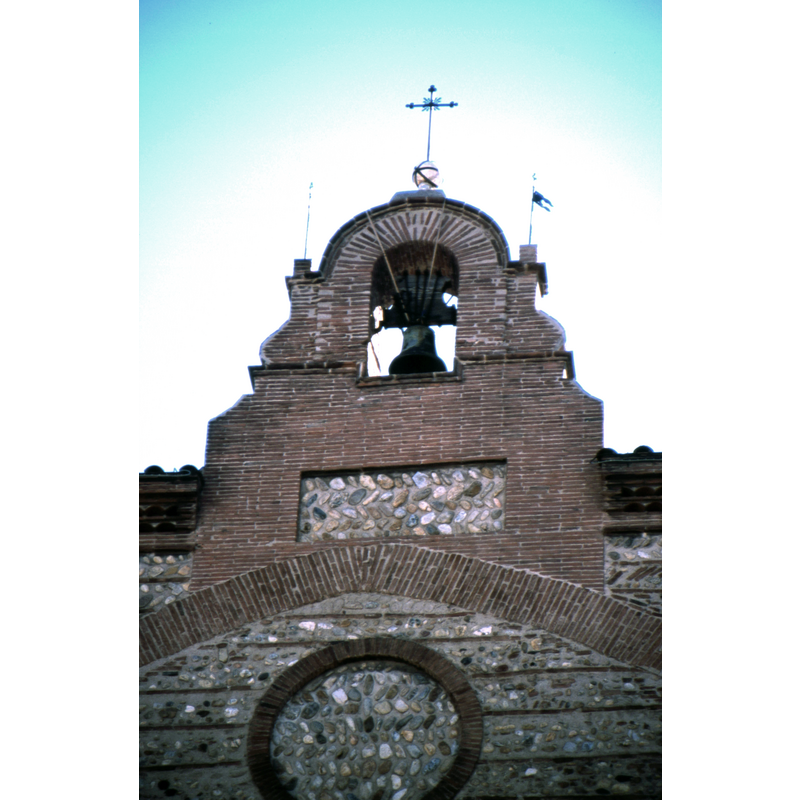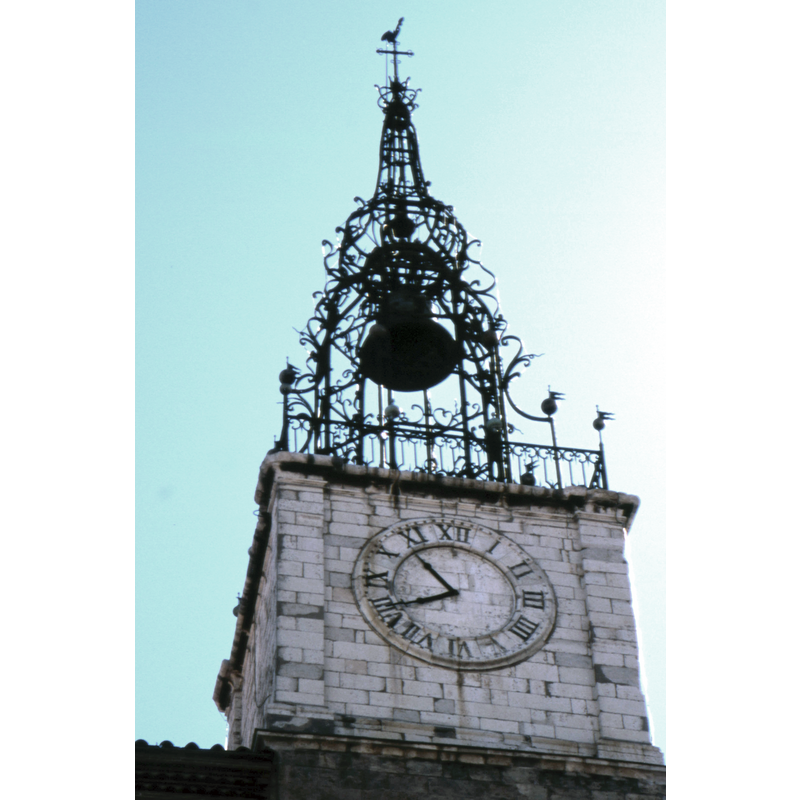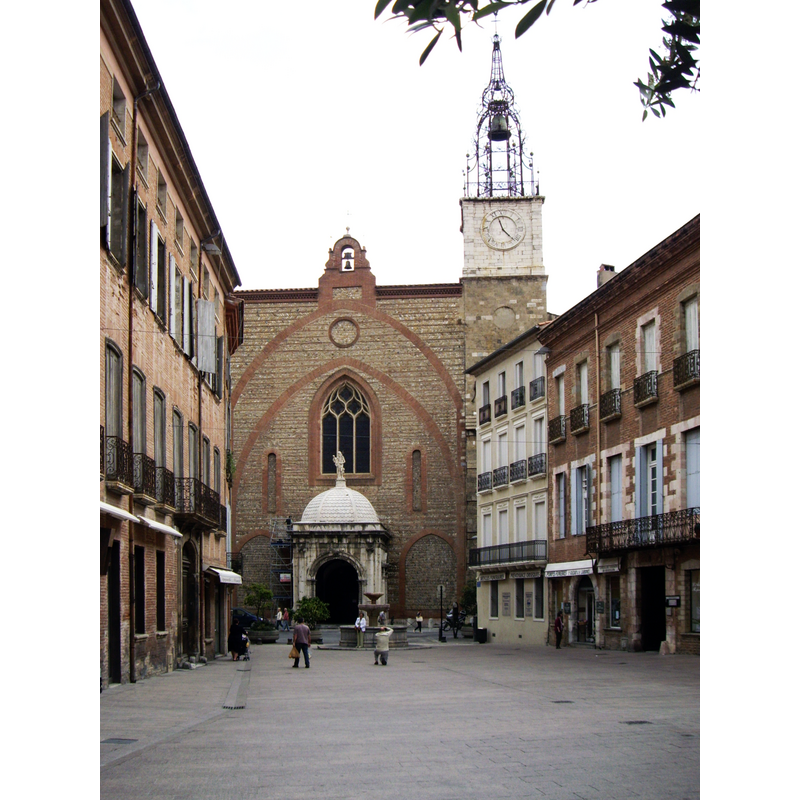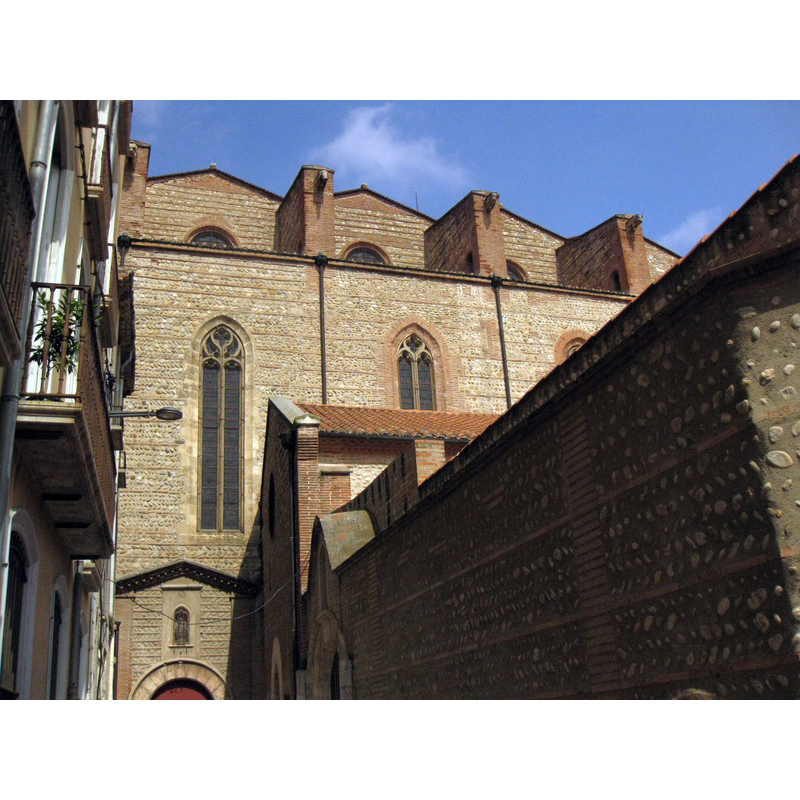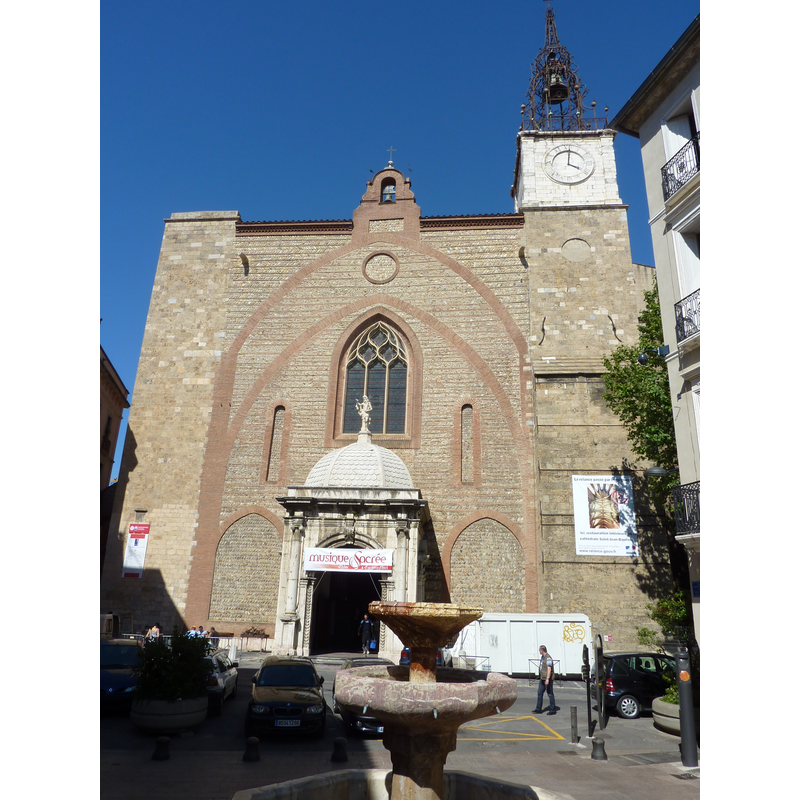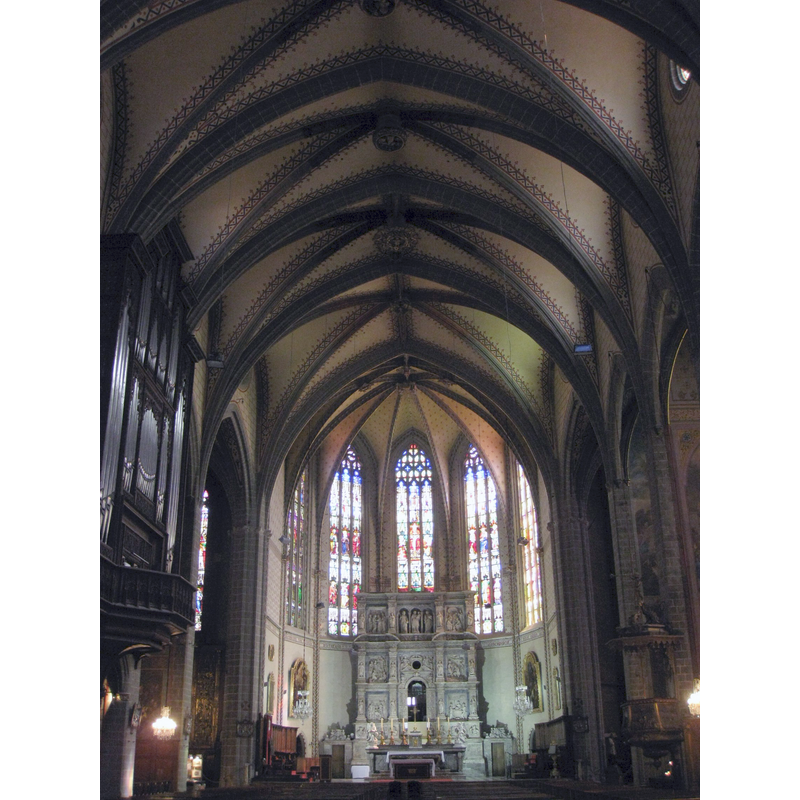Perpignan No. 1 / Perpinyà
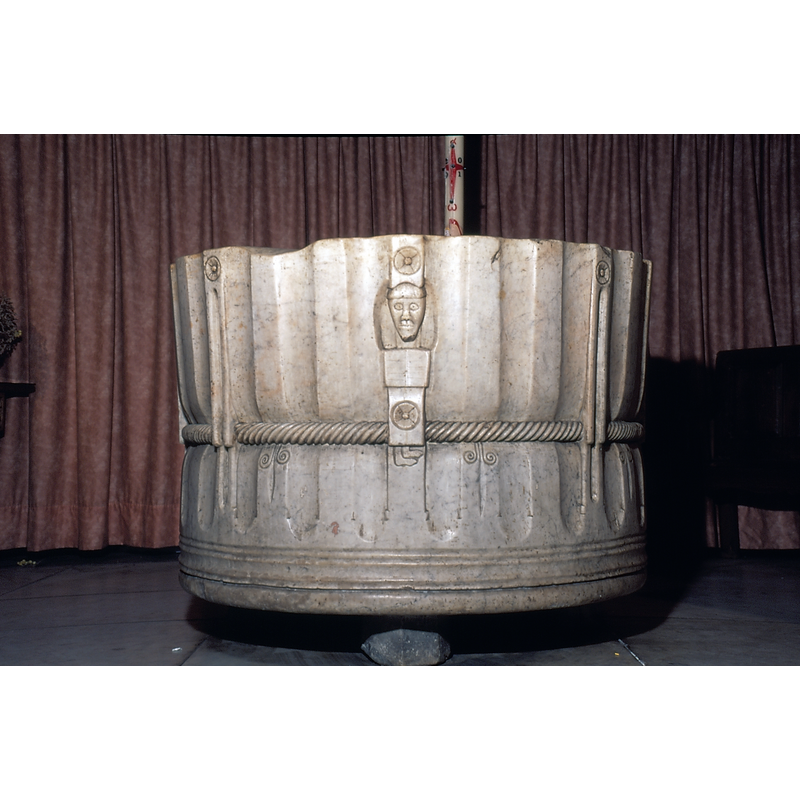
Image copyright © Baptisteria Sacra Index, 2023
CC-BY-NC-ND-4.0
Results: 27 records
view of font - south view
design element - motifs - floral - rosette - 4 petals
Scene Description: Several of them on the side of the basin; one over and another under the figure as well -- notice the lead plug in the upper rim, just above the figure; there is another at the opposite end (?) of the rim, evidence of anchorings for an old cover
Copyright Statement: Image copyright © Baptisteria Sacra Index, 2023
Image Source: digital image of a photograph taken 21 June 2001 by BSI
Copyright Instructions: CC-BY-NC-ND-4.0
view of basin's top - detail
inscription - partial view
view of basin - detail
design element - motifs - floral or foliage
view of basin - detail
design element - motifs - rope moulding
human figure - standing - with book
Scene Description: On the south side of the basin [NB: Ponsich identifies this figure as Christ]; the book is not really held by the figure but, rather, it makes up his chest
Copyright Statement: Image copyright © Baptisteria Sacra Index, 2023
Image Source: digital image of a photograph taken 21 June 2001 by BSI
Copyright Instructions: CC-BY-NC-ND-4.0
design element - patterns - fluted
Scene Description: all around the vat-like basin -- notice the damage to the rim side, probably related to an old cover anchorings
Copyright Statement: Image copyright © Baptisteria Sacra Index, 2023
Image Source: digital image of a photograph taken 21 June 2001 by BSI
Copyright Instructions: CC-BY-NC-ND-4.0
design element - motifs - moulding - parallel
design element - architectural - arch
inscription - partial view
design element - motifs - circle
inscription - partial view
Scene Description: notice the lead plug fit into the rim; there is another one at the opposite end (?), right above the little figure
Copyright Statement: Image copyright © Baptisteria Sacra Index, 2023
Image Source: digital image of a photograph taken 21 June 2001 by BSI
Copyright Instructions: CC-BY-NC-ND-4.0
inscription - detail
view of basin - interior - detail
inscription
view of church exterior - west porch
view of church exterior - bell-cote
view of church exterior - west tower - detail
view of church exterior in context
Scene Description: the west view of the cathedral
Copyright Statement: Image copyright © Florent Pécassou, 2007
Image Source: digital photograph taken 21 May 2007 by Florent Pécassou [http://commons.wikimedia.org/wiki/File:Perpignancathedralestjean.jpg] [accessed 16 February 2014]
Copyright Instructions: CC-BY-SA-3.0
view of church exterior - south view - detail
Copyright Statement: Image copyright © Enfo, 2011
Image Source: digital photograph taken 19 September 2011 by Enfo [http://commons.wikimedia.org/wiki/File:Catedral_de_Perpinyà,_façana_sud.jpg] [accessed 16 February 2014]
Copyright Instructions: CC-BY-SA-3.0
view of church exterior - west façade
Scene Description: the main entrance on place Gambetta
Copyright Statement: Image copyright © Henri Moreau, 2010
Image Source: digital photograph taken 22 June 2010 by Henri Moreau [http://commons.wikimedia.org/wiki/File:088_Perpignan_Cathédrale_Saint-Jean.JPG] [accessed 16 February 2014]
Copyright Instructions: CC-BY-SA-3.0
view of church interior - nave - looking east
Copyright Statement: Image copyright © Enfo, 2011
Image Source: digital photograph taken 19 September 2011 by Enfo [http://commons.wikimedia.org/wiki/File:Catedral_de_Perpinyà,_nau_i_presbiteri.jpg] [accessed 16 February 2014]
Copyright Instructions: CC-BY-SA-3.0
information
INFORMATION
Font ID: 02514PER
Object Type: Baptismal Font1
Date Visited: 2001-06-21
Font Century and Period/Style: 8th century / 11th - 12th century, Visigothic? / Romanesque?
Cognate Fonts: Other "vat" fonts at Piolenc [now missing], Venasque, etc.
Church / Chapel Name: Cathédrale Saint-Jean [said to be originally from Malloles]
Font Location in Church: In a chapel, north side, west end
Church Patron Saint(s): St. John
Church Notes: Saint-Jean-le-Vieux church originally Romanesque (12th-13thC); re-built between 1324-1509. Listed in Mérimée [ref.: PA00104067]
Church Address: 1 rue de l'Horloge, 66000 Perpignan, France -- Tel.: +33 4 68 51 33 72
Site Location: Pyrénées-Orientales, Occitanie, France, Europe
Directions to Site: On the Atlantic coast, just N of the Spanish border. Other large fonts just 12 kms SE at Argelès; two more at Venasque and Piolenc [now missing], N of Avignon
Ecclesiastic Region: Diocèse de Perpignan-Elne [anciennement diocèse d'Elne]
Historical Region: Roussillon
Additional Comments: re-cycled font? (said to be originally from nearby Malloles; also elements of re-cutting, etc.)
Font Notes:
Click to view
Baptismal font "sans support ... prennent la forme d'un cuvier" (Chastel, 1966). Corblet (1881-1882) illustrates both the elevation and the plant. The sides of the font have wide vertical concave fluting interrupted by a few reinforcement-like motifs and a niche containing a human figure; about 2/3 down the side there is a horizontal rope motif surrounding the whole vat-like structure; on the upper surface of the rim there is an inscription [cf. Inscription]; Corblet (ibid.) dates it to the 9th century. Enlart (1902) dates it to the 11th century. Delcor (1973) gives the old Visigothic church at the town of Malloles, to the south of Perpignan, as the likely origin of this great font, and informs that the font was first moved to the church of Saint-Jean-le-Vieux in the 15th century, and later to the present cathedral of Saint-Jean; he also states the possibility that the font and the inscription be of a different date, the former "paraissant beacoup plus ancienne que l'inscription". This latter view is also defended by Ponsich (1980), who places the font no later than the 8th century and identifies the stone as Carrara marble; he also identifies the human figure on the reinforcement-like motif as Christ coiffed with a camelaucum [camelaukion/ camelaucium], which he refers to Syrian/Greek tradition; the rectangle under the head is identified by Ponsich (ibid.) as the Divine Book [="Livre de la parole divine"]. Listed in Palissy [ref.: PM66000584]: "11e siècle [...] Cette pièce unique, vraissemblablement taillée dans un fût de colonne romaine cannelée, pourrait recevoir une datation reculée aux environs de 800 [...] Marbre de Carrare. La paroi de la cuve est ornée d'une mouluration en forme de cordage tressé et de rosettes. Apparaît également en relief la figure du Christ, au-dessous de laquelle est représenté un évangile ouvert." Illustrated in Mémoire [NUMPs: MH0080695, 66w00002]. On-site notes: this is a magnificent object, one of a kind; there is nothing like it anywhere, although there are several other early "vat-like" fonts. This huge and most striking marble vat gives the impression of having been carved out of a gigantic Roman column. As scholars have pointed out, it is very likely that the different elements (the actual object, the carvings, the inscription, its use as a baptismal font, etc.) may belong to different periods (e.g., the simplistic feet of the figure, for example, are totally out of character with the rest of the figure and are most liklely a later addition; the same is probably true of the inscription). It is in a remarkable state of repair. The font is raised on several "feet" now, but they do not seem to be original or part of the font itself. Although no lid has been kept, there is evidence of four hinges on the upper surface of the rim.
Credit and Acknowledgements: We are grateful to the friendly and helpful staff at the cathedral for the facilities given us to document this font
COORDINATES
UTM: 31T 491556 4727573
Latitude & Longitude (Decimal): 42.7006, 2.8969
Latitude & Longitude (DMS): 42° 42′ 2.16″ N, 2° 53′ 48.84″ E
MEDIUM AND MEASUREMENTS
Material: stone, marble (Carrara) (white)
Number of Pieces: one
Font Shape: round, unmounted, vat-shaped
Basin Interior Shape: round
Basin Exterior Shape: round
Drainage System: centre hole in basin
Drainage Notes: no lining
Rim Thickness: 10-14 cm
Diameter (inside rim): 115-116 cm
Diameter (includes rim): 136-142 cm
Basin Depth: 70 cm
Height of Basin Side: 91 cm
Basin Total Height: 91 cm
Height of Base: 14 cm
Font Height (less Plinth): 91 cm
Font Height (with Plinth): 105 cm
Notes on Measurements: BSI on-site
INSCRIPTION
Inscription Language: Latin
Inscription Location: on the upper surface of the rim
Inscription Text: "+ UNDA ZACRI FONTIS + NE[c]AT ANGVIS SIBILA SONTIS +"
["+UNDA SACRA FONTIS NECAT ANGUIS SIBILA SONTIS"]
Inscription Notes: Delcor, after De Bonnefoy, gives the second word as "ZACRA" [cf. illustration from Corblet], and the French translation as "L'eau de cette piscine sacrée étouffe le sifflement du serpent criminel" (Delcor, 1973: 99)
Inscription Source: Corblet (1881-1882: v. 2, p. 135); also in Delcor (1973: 99) and Ponsich (1980: 300)
LID INFORMATION
Notes: there is, however, evidence of old hinges on the upper surface of the rim
REFERENCES
- Bond, Francis, Fonts and Font Covers, London: Waterstone, 1985 c1908, p. 123
- Chastel, André, Histoire générale des Églises de France, Belgique, Luxembourg, Suisse, France: Robert Laffont, 1966, p. 287
- Corblet, Jules, Histoire dogmatique, liturgique et archéologique du sacrement de baptême, Paris: V. Palme, 1881-1882, vol. 2, p. 135-136
- Davies, J.G., The Architectural Setting of Baptism, London: Barrie and Rockliff, 1962, p. 64
- Delcor, M., "Cuves romanes et leur figuration en Roussillon, Cerdagne et Conflent", 1973, no. 4, Cahiers de Saint-Michel de Cuxa, 1973, pp. 96-109; p. 99-100
- Enlart, Camille, Manuel d'archéologie française depuis les temps mérovingiens jusqu'à la Renaissance, Paris: Alphonse Picard & fils, 1902, p. 772
- Fundació Enciclopèdia Catalana, Catalunya romànica, Barcelona: Fundació Enciclopèdia Catalana, 1984-, vol. XX: 174
- Lasteyrie du Saillant, Robert Charles, conte de, Architecture réligieuse en France à l'époque romane (2e éd., avec une bibliographie critique par Marcel Aubert), Paris: A. Picard, 1929, p. 698-699 and pl. 706
- Mestre i Godes, Jesús, Viatge al romànic català: la Catalunya nord, Barcelona: RACC Club-Edicions 62, 2000, p. 155-157
- Ponsich, P., "Les plus anciennes sculptures médiévales du Roussillon (5-11 siécle)", 11, Cahiers Saint-Michel-de-Cuxa, 1980, pp. 293-331, 33 fig.; p. 300-302
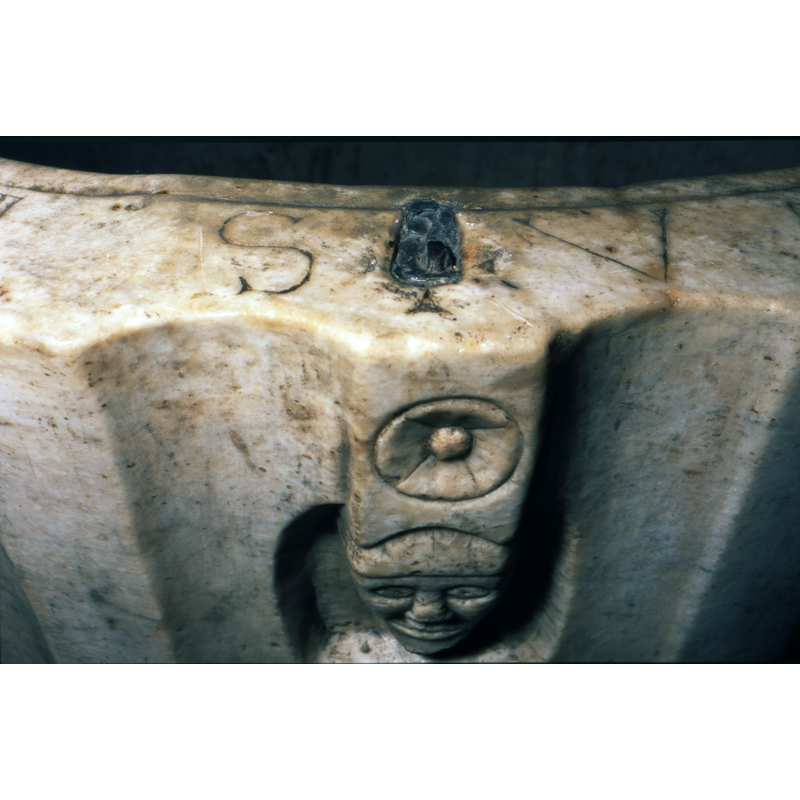
![[cf. Inscription area]](/static-50478a99ec6f36a15d6234548c59f63da52304e5/compressed/PER0107231_compressed.png)
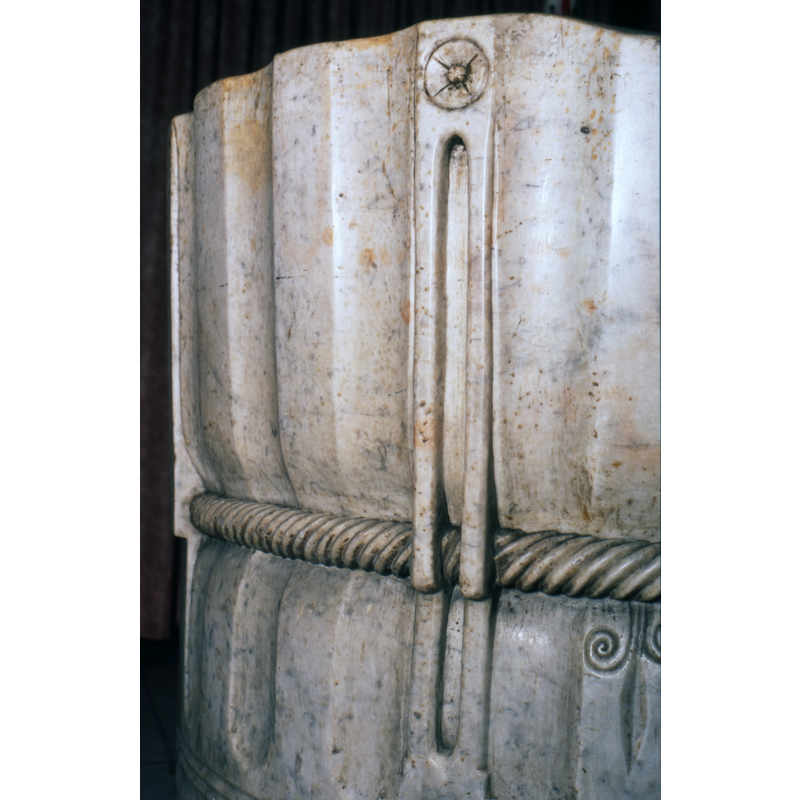
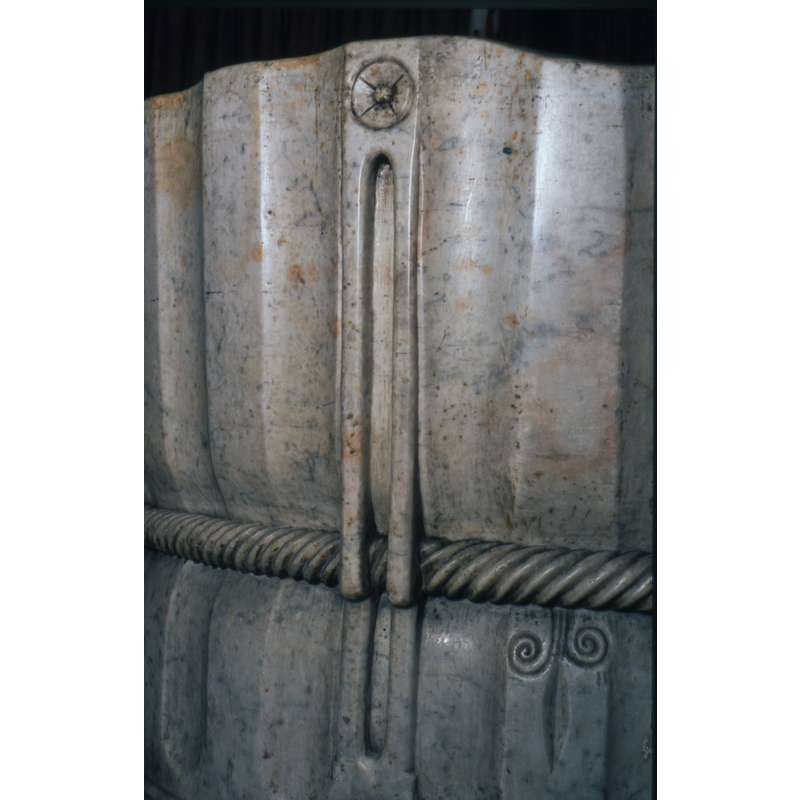
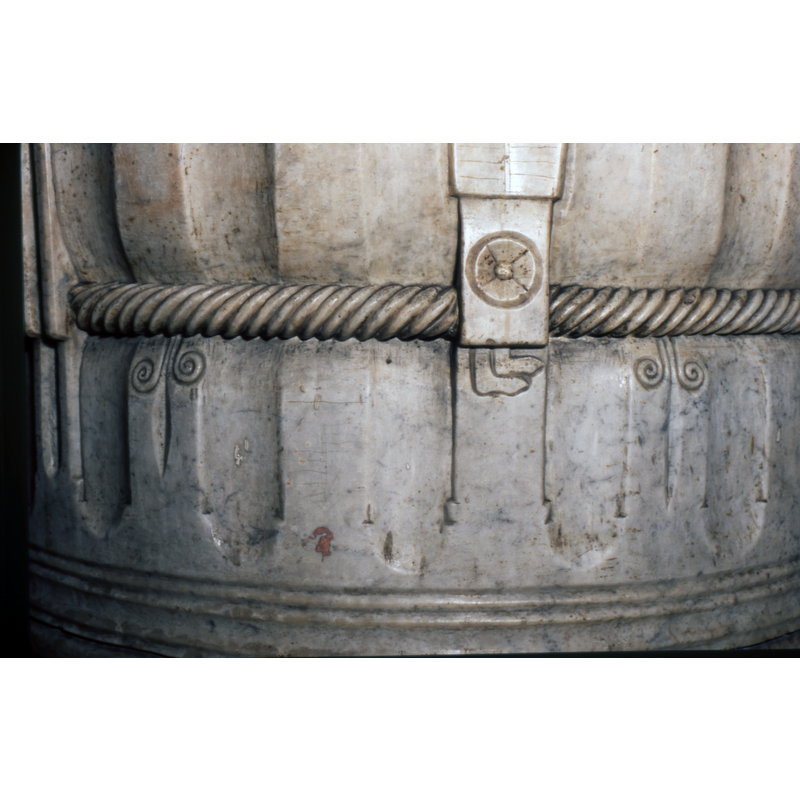
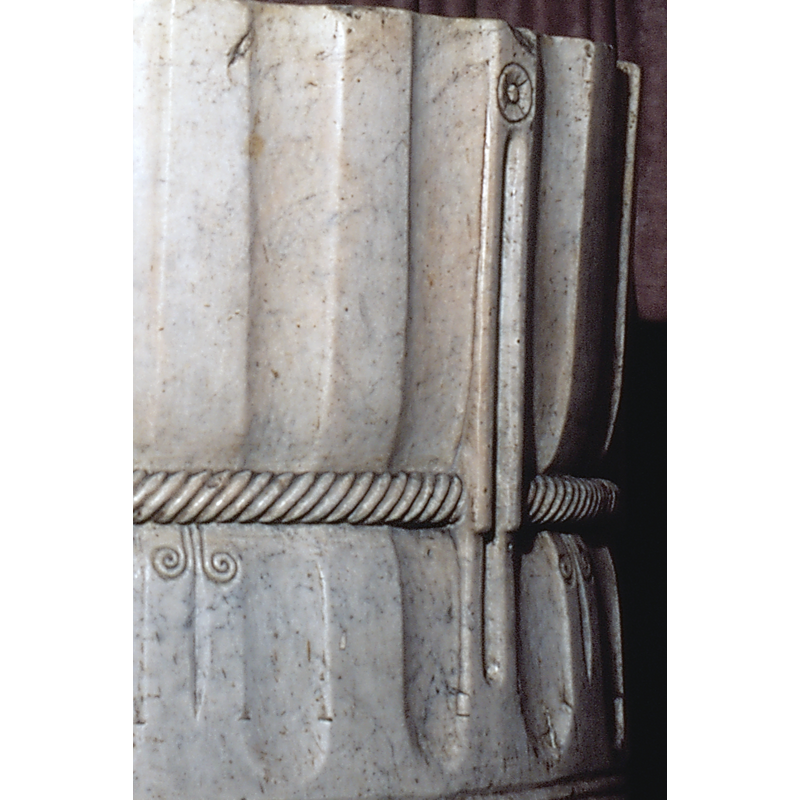
![On the south side of the basin [NB: Ponsich identifies this figure as Christ]; the book is not really held by the figure but, rather, it makes up his chest](/static-50478a99ec6f36a15d6234548c59f63da52304e5/compressed/PER0107215_compressed.png)
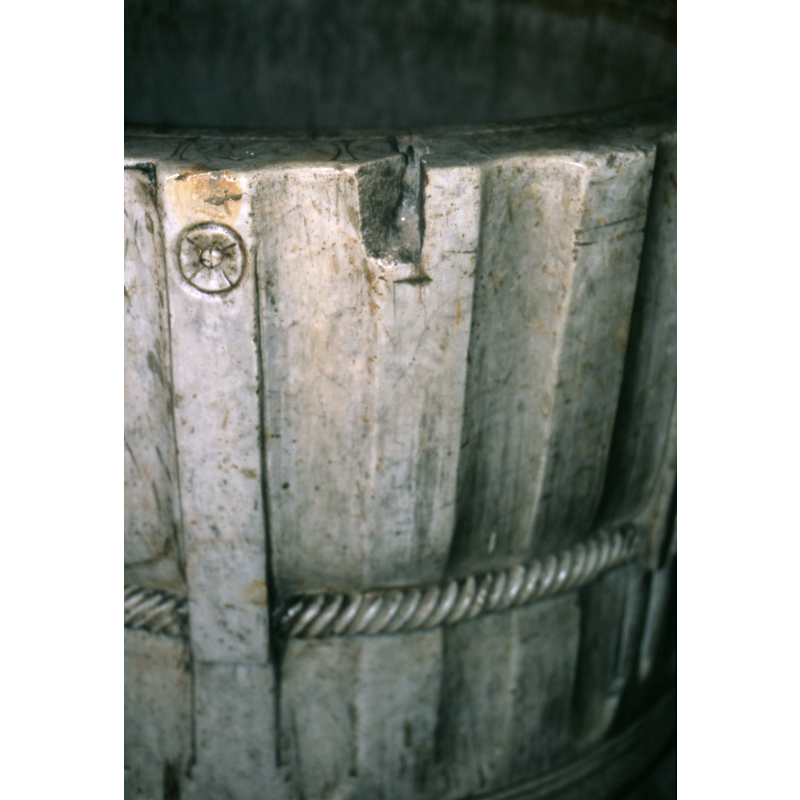
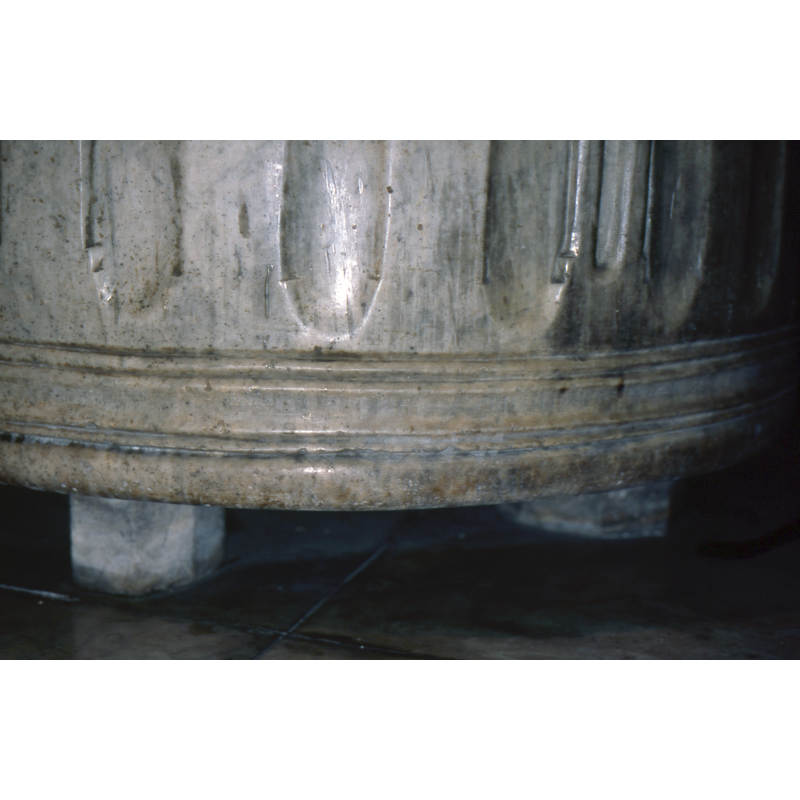
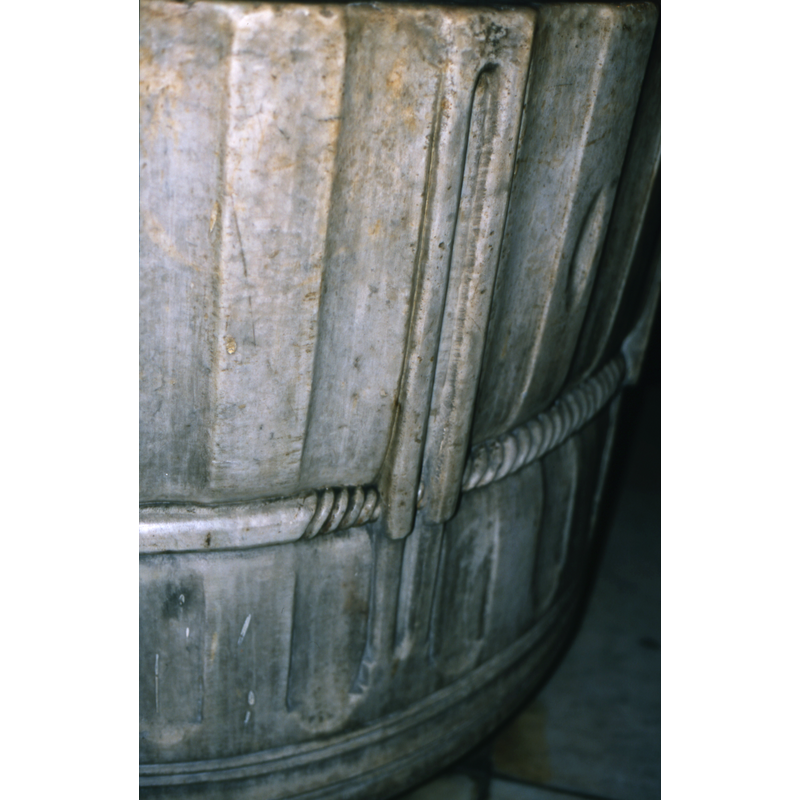
![[cf. Inscription area]](/static-50478a99ec6f36a15d6234548c59f63da52304e5/compressed/PER0102630_compressed.png)
